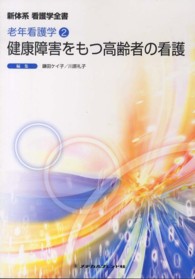- ホーム
- > 洋書
- > 英文書
- > History / World
Full Description
The 1971 genocide in Bangladesh took place as a result of the region's long history of colonization, the 1947 partition of the Indian subcontinent into largely Muslim Pakistan and Hindu India, and the continuation of ethnic and religious politics in Pakistan, specifically the political suppression of the Bengali people of East Pakistan. The violence endured by women during the 1971 genocide is repeated in the writing of national history. The secondary position that women occupy within nationalism is mirrored in the nationalist narratives of history.
This book engages with the existing feminist scholarship on gender, nationalism and genocide to investigate the dominant representations of gender in the 1971 genocide in Bangladesh and juxtaposes the testimonies of survivors and national memory of that war to create a shift of perspective that demands a breaking of silence. The author explores and challenges how gender has operated in service of Bangladeshi nationalist ideology, in particular as it is represented at the Liberation War Museum. The archive of this museum in Bangladesh is viewed as a site of institutionalized dialogue between the 1971 genocide and the national memory of that event. An examination of the archive serves as an opening point into the ideologies that have sanctioned a particular authoring of history, which is written from a patriarchal perspective and insists on restricting women's trauma to the time of war. To question the archive is to question the authority and power that is inscribed in the archive itself and that is the function performed by testimonies in this book. Testimonies are offered from five unique vantage points - rape survivor, war baby, freedom fighter, religious and ethnic minorities - to question the appropriation and omission of women's stories. Furthermore, the emphasis on the multiplicity of women's experiences in war seeks to highlight the counter-narrative that is created by acknowledging the differences in women's experiences in war instead of transcending those differences.
An innovative and nuanced approach to the subject of treatment and objectification of women in conflict and post conflict and how the continuing effects entrench ideas of gender roles and identity, this book will be of interest to academics in the fields of South Asian History and Politics, Gender and genocide, Women and War, Nationalism and Diaspora and Transnational Studies.
Contents
1. Introduction 2. Historical Background 3. Gender, Nationalism and Genocide 4. Archives, Museums and the Politics of Representation 5. Stories of Resistance 6. Conclusion






